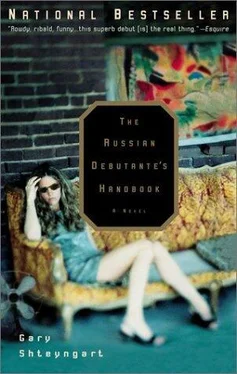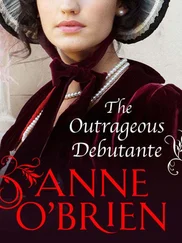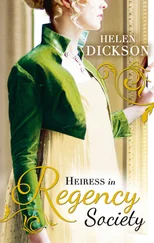Gary Shteyngart - The Russian Debutante's Handbook
Здесь есть возможность читать онлайн «Gary Shteyngart - The Russian Debutante's Handbook» весь текст электронной книги совершенно бесплатно (целиком полную версию без сокращений). В некоторых случаях можно слушать аудио, скачать через торрент в формате fb2 и присутствует краткое содержание. Город: New York, Год выпуска: 2003, ISBN: 2003, Издательство: Riverhead Books, Жанр: Современная проза, Юмористическая проза, на английском языке. Описание произведения, (предисловие) а так же отзывы посетителей доступны на портале библиотеки ЛибКат.
- Название:The Russian Debutante's Handbook
- Автор:
- Издательство:Riverhead Books
- Жанр:
- Год:2003
- Город:New York
- ISBN:0-7865-4177-6
- Рейтинг книги:4 / 5. Голосов: 1
-
Избранное:Добавить в избранное
- Отзывы:
-
Ваша оценка:
- 80
- 1
- 2
- 3
- 4
- 5
The Russian Debutante's Handbook: краткое содержание, описание и аннотация
Предлагаем к чтению аннотацию, описание, краткое содержание или предисловие (зависит от того, что написал сам автор книги «The Russian Debutante's Handbook»). Если вы не нашли необходимую информацию о книге — напишите в комментариях, мы постараемся отыскать её.
and
. The Russian Debutante’s Handbook Bursting with wit, humor, and rare insight,
is both a highly imaginative romp and a serious exploration of what it means to be an immigrant in America.
The Russian Debutante's Handbook — читать онлайн бесплатно полную книгу (весь текст) целиком
Ниже представлен текст книги, разбитый по страницам. Система сохранения места последней прочитанной страницы, позволяет с удобством читать онлайн бесплатно книгу «The Russian Debutante's Handbook», без необходимости каждый раз заново искать на чём Вы остановились. Поставьте закладку, и сможете в любой момент перейти на страницу, на которой закончили чтение.
Интервал:
Закладка:
“Right,” said Vladimir, “Air Raid Shelter, Reprè, Martini Bar…”
“You never told me you were starting a literary mag,” Larry said, maneuvering out of Cohen’s arms, nearly throwing the jilted Iowan off balance.
“Well, you never told me you were a writer,” Vladimir said. “I’m a little hurt, actually. Your talent is shocking.”
“How strange,” Larry said. “That’s the first thing I usually mention.”
“No matter,” Vladimir said. “That story definitely belongs in…” They never had settled on a name for the magazine. Something Latin, French, Mediterranean—yes, Mediterranean cuisine was gaining in global popularity, surely its literature would follow. Now what was the name of that famous Sicilian alchemist and charlatan? “Cagliostro.”
“Dig the name.”
Indeed. “Only I can’t really make that kind of editorial decision,” Vladimir said. “You need to talk to my editor-in-chief Perry Cohen over there. Me, I’m just the publisher.” But before Vladimir could redeem his plummeting stock with Editor & Friend Cohen, Harry Green was lowing for them all to sit and pipe down in his purposeful Canadian Prairie way. “Vladimir Girshkin,” he called out. “Who is Vladimir Girshkin?”
Who indeed?
Vladimir Girshkin was a man who once instinctively moved in the wrong direction and invariably got knocked down every time he saw a person running his way. Vladimir Girshkin once said “thank you” and “sorry” when there was absolutely no need, and often employed a bow so deep it would have been excessive at Emperor Hirohito’s court. Once upon a time Vladimir Girshkin held Challah in his reed-thin arms and prayed that she would never be hurt again, and, to that end, vowed to be her protector and benefactor.
But presently he held a single sheet of paper in front of him, his right arm unfolding predictably like an architect’s swivel lamp… Steady as she goes…
He read:
This is how I see my mother—
In a dirty Formica restaurant,
simple pearls from her birthland
around her tiny freckled neck.
Sweat-dappled,
she is buying me a three-dollar dish of lo mein,
gleaming over the gold watch
we found for a bargain,
four hours of a heatstroke Chinatown afternoon
behind us. Blushing as she says,
“I’ll just have water, please.”
There it was. A poem with little to impart but with clean lines like the room at a good bed-and-breakfast: simple wooden furniture, a tasteful framed print hanging above the couch of some sylvan scene—moose-in-brook, cabin-lost-in-trees, whatever. In other words, thought Vladimir, it was absolutely nothing. The kind of garbage that finds its own void and soundlessly disappears into same.
Pandemonium! Standing ovation! A regular riot! The Bolsheviks were storming the Winter Palace, the Viet Cong were massing around the American embassy, Elvis had entered the building. Apparently nobody in the Joy crowd had yet thought of writing a small poem that wasn’t entirely self-conscious or self-referential. NATO planes had not yet been called in to carpet-bomb the city with William Carlos Williams’s collected work. It was quite a coup for Vladimir.
Amid the blare of applause and the trumpet of Maxine delivering her lip-to-lip kiss for the public record, Vladimir made a note of another promising phenomenon: a woman of deeply American appearance (although she was not blond), a clear-skinned, full-faced, brown-haired young woman dressed in mail-order outdoorsy pants and linen blouse, who probably smelled like an environmentally correct shampoo of apples and citrus with an undercurrent of rain-forest soap, was clapping away, her ruddy face made all the more so with simple, unabashed adulation for Vladimir Girshkin. Our man in Prava.
UPSTAIRS, AT THEvegetarian portion of the Joy, a round metal table of Stolovan unsturdiness was rolled out for the conquering heroes; it tipped back and forth beneath portions of black hummus the consistency of loam and the tureens of beet-red minestrone top-heavy with actual beets. Vladimir got placed in a little male semicircle of Cohen (who refused to look at Vladimir), Larry Litvak (who wouldn’t bother looking at anyone else), and Plank (unconscious). Vladimir glanced about nervously, feeling a heterosexual opportunity being squandered. To wit, the clean and comely American woman he had branded with his verse had also made the trek upstairs. She was sitting at the “Carrot Bar” with the rest of the peons, chatting up a tourist boy. At measured intervals she looked over to Vladimir’s table and smiled with her ointment-shiny lips and milk-white teeth, as if to quash the rumor that she wasn’t enjoying herself.
King Vladimir waved her over—it was something new he was learning to do with his hand. And he was getting good at it, for instantly she picked her purse off the bar and left the tourist boy with his beer and his crew cut and his stories of what the governor did at his sister’s wedding.
“Scoot over,” Vladimir said to the boys and the seats were shuffled, water spilled, complaints voiced.
She was awkward, navigating to her seat (“sorry, sorry, sorry”) and Vladimir didn’t help matters by moving closer to sniff at her linen blouse. Yes, rain-forest soap. Correct. But what to make of the rest of her? She had what in the Girshkin family would be considered the beginnings of a nose, an outcropping really, a small belvedere overlooking the long, thin lips, circular chin, and beneath that the full breasts that bespoke a successful American adolescence. Vladimir had but one thought: Why was her hair past shoulder-length, given the present-day urban conventions that demanded shortness, brevity? Was she, perhaps, a stranger to hipness? Questions, questions.
But like most pretty people she made a positive impression on the Crowd. “Hi,” Alexandra said to her, and by the sparkling expression on her face it might as well have been a cry of “Landsman!”
“Hi,” the newcomer said.
“I’m Alexandra.”
“I’m Morgan.”
“Nice to meet you, Alexandra.”
“Nice to meet you, Morgan.”
And then the niceness ended and was replaced by a universal uproar over the talentless Harry the Canadian and how everything would be so much better, so much more dignified, if they (the Crowd) owned the Joy and its literary legacy. Here all eyes turned to Vladimir. Vladimir sighed. The Joy? Wasn’t the goddamn literary magazine enough for them? What next, a Gertrude Stein theme park? “Listen,” Vladimir said, “we’ve got to get the ball rolling on Cagliostro. ”
“Ca—what?” Cohen said.
“The magazine,” Larry Litvak said with a roll of the eyes. When not stoned out of his gourd he apparently found ignorance quite shocking.
“We’re calling it what ?” Cohen said, turning on Vladimir.
“Remember you were reading that obscure Milanese metahistorical journal about that Sicilian charlatan and alchemist, Cagliostro, and you said, ‘Hey, aren’t we all just a little like him, staking out our claim in this postsocialist wilderness?’ Remember?”
“Cag-li-ostro!” Alexandra said with flair. “Oh, I like that.”
There were murmurs of approbation.
“Right,” Cohen said. “Actually I was thinking of a couple of names, like maybe Beef Stew, but… You’re right. Whatever. Let’s just run with my first thought.”
“So this is not going to be a mainstream journal,” Morgan said. She looked very sober there, with her hands in her lap, her eyes open wide, her well-plucked eyebrows raised as she tried to put in her two cents among the loud and fractious Crowd. It was bewildering for Vladimir to see a beautiful person who didn’t make herself the center of attention in one way or another (Alexandra always pulled it off so well!), and he didn’t make things any easier by saying: “Main stream? We’re not even treading the same brook as the others.”
Читать дальшеИнтервал:
Закладка:
Похожие книги на «The Russian Debutante's Handbook»
Представляем Вашему вниманию похожие книги на «The Russian Debutante's Handbook» списком для выбора. Мы отобрали схожую по названию и смыслу литературу в надежде предоставить читателям больше вариантов отыскать новые, интересные, ещё непрочитанные произведения.
Обсуждение, отзывы о книге «The Russian Debutante's Handbook» и просто собственные мнения читателей. Оставьте ваши комментарии, напишите, что Вы думаете о произведении, его смысле или главных героях. Укажите что конкретно понравилось, а что нет, и почему Вы так считаете.












